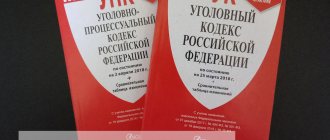1. Threat of murder or infliction of grievous bodily harm, if there were grounds to fear that this threat would be carried out, -
shall be punishable by compulsory labor for a term of up to four hundred eighty hours, or restriction of liberty for a term of up to two years, or forced labor for a term of up to two years, or arrest for a term of up to six months, or imprisonment for a term of up to two years.
2. The same act committed for reasons of political, ideological, racial, national or religious hatred or enmity, or for reasons of hatred or enmity in relation to any social group, as well as in relation to a person or his relatives in connection with the performance of an official function by this person activities or fulfillment of public duty, -
shall be punishable by forced labor for a term of up to five years with deprivation of the right to hold certain positions or engage in certain activities for a term of up to three years or without it, or imprisonment for a term of up to five years with deprivation of the right to hold certain positions or engage in certain activities for a term of up to three years, or without one.
- Article 118. Causing grievous bodily harm through negligence
- Article 120. Coercion to remove human organs or tissues for transplantation
Commentary to Art. 119 of the Criminal Code of the Russian Federation
The object of the threat of murder or infliction of grievous harm to health consists of social relations that develop regarding the realization of the natural right of every person to life and health and ensuring the security of these social benefits. When threatened with murder, a threat of harm to relationships is created that ensures the safety of life and real harm to the health of the victim; when there is a threat of causing serious harm to health, the latter, on the one hand, is endangered, and on the other hand, it suffers real harmful consequences. Any person can be a victim, regardless of his age, state of health, ability to understand the meaning and significance of the threat and other circumstances.
The objective side is expressed in the form of active information actions - threats of murder or causing serious harm to health. The corpus delicti is formal; the consequences of the threat are outside its scope and do not affect qualifications. The crime is considered completed from the moment the threat is expressed or demonstrated, regardless of when it was perceived by the victim.
A threat is an informational impact on the victim’s psyche discovered externally and designed to intimidate the victim, expressing the subjective determination and intention of the perpetrator to cause death or serious harm to health. Methods of carrying out a threat can be different: verbal, written, gestures, through actions, etc.; a threat can be expressed, in particular, in the demonstration of weapons (clause 23 of the Resolution of the Plenum of the Supreme Court of the Russian Federation of December 27, 2002 No. 29 “On judicial practice in cases of theft, robbery and robbery”). What is common is the transmission of certain information about the socially dangerous intention of the subject.
A mandatory sign of a threat of murder or grievous bodily harm is its reality. To recognize a threat as real, it is necessary to establish that the perpetrator committed such actions that gave the victim reason to fear its implementation, and that the behavior of the perpetrator and his relationship with the victim objectively testified to the reality of the threat. The reality of the threat is established in each specific case, taking into account all the factual circumstances of the case. It is necessary to take into account both the objective criterion of reality (the method of expression, the intensity of the threat, the nature of the relationship between the perpetrator and the victim, the objective situation of the threat, the personality traits of the perpetrator, etc.), and the subjective perception of it by the victim as real.
The content of the threat is the expression of the intention to take life or cause serious harm to health. Responsibility for threats of other content (for example, threats to destroy property) in Art. 119 of the Criminal Code of the Russian Federation is not provided for; such threats entail liability only if they act as a method of committing another crime (for example, provided for in Article 163 of the Criminal Code of the Russian Federation). In cases where the perpetrator expresses threats of violence that are of an uncertain nature, the question of recognizing the person’s actions as a crime under Art. 119 of the Criminal Code of the Russian Federation, must be decided taking into account all the circumstances of the case: the place and time of the crime, the nature of the objects with which he threatened the victim, the subjective perception of the threat, the commission of any specific demonstrative actions, etc. .
———————————
By analogy with paragraph 23 of the Resolution of the Plenum of the Supreme Court of the Russian Federation of December 27, 2002 No. 29 “On judicial practice in cases of theft, robbery and robbery.”
The threat can be expressed either directly to the victim himself or through third parties. It is important that it is addressed to a specific person. Threats of murder or infliction of grievous bodily harm against an indefinite number of persons are not covered by Art. 119 of the Criminal Code of the Russian Federation, but under certain circumstances they can form part of another crime (for example, provided for in Article 282 of the Criminal Code of the Russian Federation).
The threat can be one-time or repeated. Repeated or systematic threats to kill or cause grievous bodily harm, addressed to one person and carried out with a single intent, do not form a set of crimes and are qualified as a single continuing crime. If a threat is addressed to two or more persons, the act is qualified as one crime, provided that such a threat expresses the single intention of the subject of the crime; otherwise, the offense is assessed taking into account the rules for qualifying the actual totality of crimes.
The subjective side of the crime in question is characterized by guilt in the form of intent. A person, possessing free will, when threatening to kill or cause serious harm to health, is aware of the socially dangerous nature of his act. The motive for the threat (except for that specified in Part 2 of Article 119 of the Criminal Code of the Russian Federation) does not matter for qualification.
For a correct criminal legal assessment, it is important to establish the purpose of the threat, since some of them, changing the content of guilt, may indicate the presence of a different crime (for example, a threat to kill in order to break the resistance of a rape victim). Qualifications according to Art. 119 of the Criminal Code of the Russian Federation is subject to a threat of murder or infliction of grievous bodily harm, which is not an element of the objective side of another, more serious crime (for example, rape, robbery, etc.).
The subject of the general threat is a sane individual who has reached the age of sixteen; persons aged fourteen to fifteen years are not responsible for this crime.
———————————
Determination of the Judicial Collegium of the Supreme Court of the Russian Federation in the case of Bochanov // Bulletin of the Supreme Court of the Russian Federation. 2000. N 5.
The qualifying sign of threat of murder or infliction of grievous bodily harm (Part 2 of Article 119 of the Criminal Code of the Russian Federation) is identical in its content to a similar sign of murder.
If the perpetrator, not limited to threats, commits other actions aimed at creating conditions for committing murder or causing grievous bodily harm, or directly aimed at committing these actions, responsibility arises for the preparation or attempt to commit crimes provided for in the relevant part of Art. 105 or art. 111 of the Criminal Code of the Russian Federation.
The threat of murder or grievous bodily harm may be an element of the objective side of another violent crime (for example, unlawful taking of a car without the intent of theft with the threat of violence). In this case, it does not require independent additional qualifications.
Article 119 of the Criminal Code of the Russian Federation contains a general rule on liability for threats of murder or infliction of grievous bodily harm. Along with it, the law also provided for special elements of threat (for example, in Articles 296, 318 of the Criminal Code of the Russian Federation). Emerging competition is resolved in accordance with the rules of Part 3 of Art. 17 of the Criminal Code of the Russian Federation.
Judicial practice under Article 119 of the Criminal Code of the Russian Federation
Resolution of the Presidium of the Supreme Court of the Russian Federation dated December 6, 2017 N 224-P17
by the resolution of the senior investigator of the prosecutor's office of the ZATO city of Zelenogorsk, Krasnoyarsk Territory dated January 18, 2002 in relation to Fedorov, who was accused of committing crimes under clauses “b”, “c” .3 tbsp. 163, art. 119 of the Criminal Code of the Russian Federation, a preventive measure was chosen in the form of a written undertaking not to leave.
Resolution of the Presidium of the Supreme Court of the Russian Federation dated December 13, 2017 N 248P17
By the resolution of the Sretensky District Court of the Trans-Baikal Territory of November 8, 2012, a criminal case was opened on charges of Tonkikh under Part 1 of Art. 111, part 1 art. 119, part 1 art. 119 of the Criminal Code of the Russian Federation was returned to the prosecutor to remove obstacles to its consideration by the court. The preventive measure against Tonkikh in the form of detention was left unchanged.
Determination of the Judicial Collegium for Criminal Cases of the Supreme Court of the Russian Federation dated May 30, 2018 N 11-UD18-14
— July 14, 2014 under Part 1 of Art. 119 of the Criminal Code of the Russian Federation to 10 months of suspended imprisonment with a probationary period of 10 months, convicted under Part 1 of Art. 318 of the Criminal Code of the Russian Federation to 2 years in prison, under Part 2 of Art. 167 of the Criminal Code of the Russian Federation to 2 years in prison, under Part 1 of Art. 119 of the Criminal Code of the Russian Federation to 1 year of imprisonment; for the totality of these crimes by partial addition of punishments on the basis of Part 2 of Art. Criminal Code of the Russian Federation - to 2 years 6 months of imprisonment.
Appeal ruling of the Judicial Collegium for Criminal Cases of the Supreme Court of the Russian Federation dated 06/05/2018 N 18-APU18-6sp
KLIMENTOV Vladimir Filippovich, ... On October 30, 2009, convicted by the Korenovsky District Court of the Krasnodar Territory, taking into account the amendments made, under Part 1 of Art. 105 and part 1 of Art. 119 of the Criminal Code of the Russian Federation using Part 3 of Art. of the Criminal Code of the Russian Federation to 8 years 3 months of imprisonment, the sentence has been served in full (July 12, 2021),
Appeal ruling of the Judicial Collegium for Criminal Cases of the Supreme Court of the Russian Federation dated June 19, 2018 N 31-APU18-7
- 10.29.1999 according to clauses “a”, “d”, “d” part 2 of art. 117, art. 119, paragraph “b”, part 2, art. 213, part 5 art. of the Criminal Code of the Russian Federation to 19 years in prison; - November 29, 1999 under Part 3 of Art. , part 1 art. 313, Art. of the Criminal Code of the Russian Federation to 19 years 3 months of imprisonment (taking into account changes made by resolutions of 03/04/2005 and 06/04/2010) - to 17 years of imprisonment, released after serving the sentence on 07/28/2016, -
Resolution of the Presidium of the Supreme Court of the Russian Federation dated June 20, 2018 N 63P18
Convicted: under Part 1 of Art. 119 of the Criminal Code of the Russian Federation to 6 months in prison, under paragraph “c” of Part 2 of Art. 158 of the Criminal Code of the Russian Federation to 2 years 6 months of imprisonment, under Part 2 of Art. 167 of the Criminal Code of the Russian Federation to 2 years in prison, under Part 2 of Art. 162 of the Criminal Code of the Russian Federation to 5 years of imprisonment, under paragraphs “e”, “g”, part 2 of Art. 105 of the Criminal Code of the Russian Federation to 16 years of imprisonment with restriction of freedom for 2 years, with the establishment of the restrictions specified in the sentence, provided for in Art. of the Criminal Code of the Russian Federation - not to travel outside the territory of the municipal formation of the Sergievsky district of the Samara region, not to change the place of residence or stay without the consent of the criminal-executive inspection, which supervises the serving of sentences in the form of restriction of freedom by convicts, to appear there twice a month for registration.
Appeal ruling of the Judicial Collegium for Criminal Cases of the Supreme Court of the Russian Federation dated July 10, 2018 N 88-APU18-4
convicted under Part 1 of Art. 119 of the Criminal Code of the Russian Federation to 1 year of imprisonment, under clause “z”, part 2 of art. 105 of the Criminal Code of the Russian Federation to 16 years of imprisonment with restriction of freedom for 2 years, under paragraph “c” of Part 4 of Art. 162 of the Criminal Code of the Russian Federation to 9 years in prison.
Appeal ruling of the Judicial Collegium for Criminal Cases of the Supreme Court of the Russian Federation dated June 27, 2018 N 53-APU18-7
Convict Bobko A.M. does not agree with the verdict regarding his conviction for attempted murder, indicates that the court did not read out the testimony of victim A. given by him during the investigation. He denies the presence of intent and conspiracy to commit a crime. The aggravating circumstance was not documented; no examination was carried out in this regard. He supports his lawyer’s appeal and asks that his actions be reclassified under Art. 119 of the Criminal Code of the Russian Federation and reduce the sentence.
Appeal ruling of the Judicial Collegium for Criminal Cases of the Supreme Court of the Russian Federation dated June 27, 2018 N 59-APU18-4
- November 17, 2021 under part 1 of article 222, part 1 of article 119 of the Criminal Code of the Russian Federation with the application of articles, of the Criminal Code of the Russian Federation to 1 year 6 months of suspended imprisonment with a probationary period of 1 year 6 months; - February 20, 2021 under Part 2 of Article 228 of the Criminal Code of the Russian Federation to 4 years of suspended imprisonment with a probationary period of 4 years,
Appeal ruling of the Judicial Collegium for Criminal Cases of the Supreme Court of the Russian Federation dated August 23, 2018 N 45-APU18-18
- July 8, 2014 under Part 1 of Art. 119 of the Criminal Code of the Russian Federation with partial addition on the basis of Part 5 of Art. Criminal Code of the Russian Federation with a punishment under the previous sentence of 1 year 3 months of imprisonment, released on October 6, 2015 after serving the sentence;
Appeal ruling of the Judicial Collegium for Criminal Cases of the Supreme Court of the Russian Federation dated 02/09/2018 N 1-APU17-12
By the resolution of the local police commissioner of police department N ... (for servicing the Oktyabrsky district of Arkhangelsk) of the Russian Ministry of Internal Affairs for the city of Arkhangelsk dated May 29, 2014, it was refused to initiate a criminal case based on a report of the commission of a crime under Art. Art. 119 and 163 of the Criminal Code of the Russian Federation, on the grounds of paragraph 1 of part 1 of Art. 24 of the Code of Criminal Procedure of the Russian Federation for the absence of a crime (vol. 3 case file 68).
Establishing the fact of a crime
Consideration of cases of threats can only be initiated by the injured party. Third parties not directly involved in the case cannot file a complaint with the police, prosecutor's office or court. Regardless of which authority the application was submitted to, the victim will have to collect evidence of the very fact of the threats to confirm the crime.
Without their provision, the police and prosecutor's office may refuse to initiate a criminal case.
The following evidence may be accepted as evidence:
- Recordings of telephone or oral conversations or video recordings in which the attacker can be heard threatening the injured party.
- Screenshots or so-called acts of inspection of a page on the Internet, with or without notarization, if the communication took place in a chat or other communication sites where the criminal could use the function of deleting messages.
- Letters and other documentary evidence of threats.
- Statements of witnesses, if any.
Threats can be one-time or repeated. In the first case, it will be quite difficult to find witnesses, with the exception of crimes committed in public places. But the second option allows you to collect any type of evidence if you write a statement to the police in a timely manner, after receiving the first threat.
In this case, law enforcement officers can help collect evidence by installing listening, recording and other devices to record the crime.





